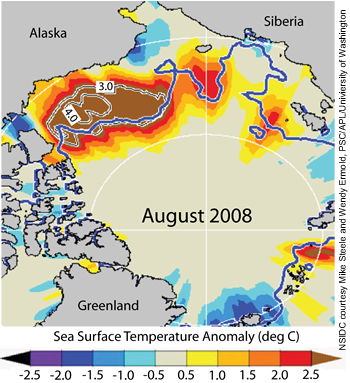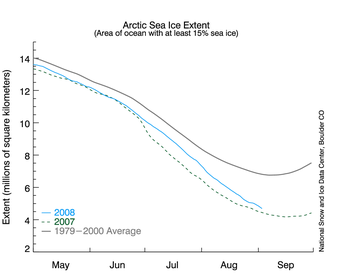Another week, another record in Arctic ice-loss announced by the National Snow and Ice Data Center:
Following a record rate of ice loss through the month of August, Arctic sea ice extent already stands as the second-lowest on record, further reinforcing conclusions that the Arctic sea ice cover is in a long-term state of decline. With approximately two weeks left in the melt season, the possibility of setting a new record annual minimum in September remains open.
Why all the melting? It is hot, hot, hot near the home state of our new global-warming-denying GOP VP nominee:
Figure: Sea surface temperature anomalies for August 2008, expressed with respect to 1982 to 2006 mean, correspond closely with ice retreat. Blue line indicates ice edge; warm colors indicate positive sea surface temperature anomalies.
Here is the latest ice extent figure along with more details on the record-breaking ice-loss in August:
In a typical year, the daily rate of ice loss starts to slow in August as the Arctic begins to cool. By contrast, in August 2008, the daily decline rate remained steadily downward and strong.
The average daily ice loss rate for August 2008 was 78,000 square kilometers per day (30,000 square miles per day). This is the fastest rate of daily ice loss that scientists have ever observed during a single August. Losses were 15,000 square kilometers per day (5,800 square miles per day) faster than in August 2007, and 27,000 square kilometers per day (10,000 square miles per day) faster than average.
This August’s rapid ice loss reflects a thin sea ice cover that needed very little additional energy to melt out.
It’s now pretty clear that the Arctic will be ice-free within a decade or so — more than half a century earlier than most climate models predicted. The time to act is yesterday.
This post was created for ClimateProgress.org, a project of the Center for American Progress Action Fund.



